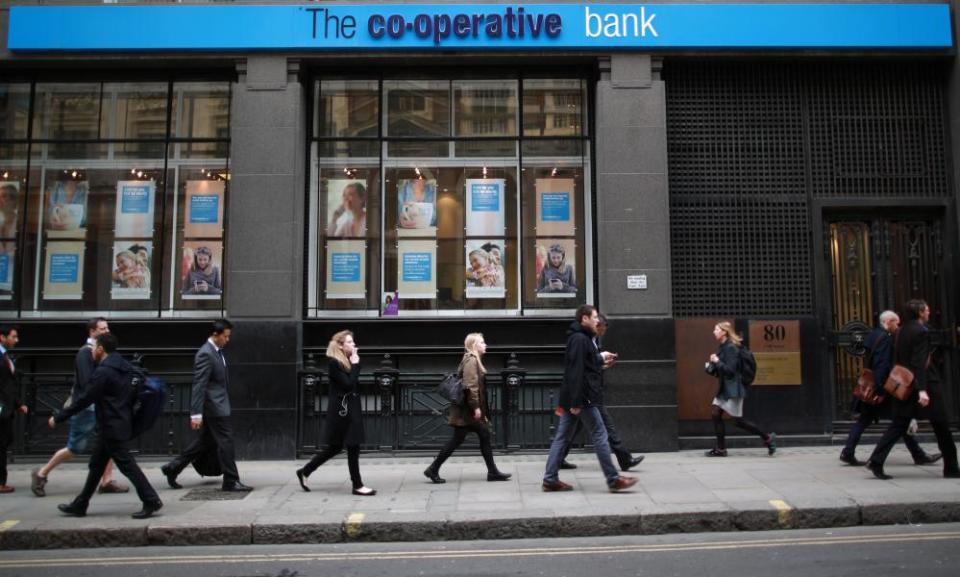Co-op Bank has lost £2.6bn since the crisis – but can still bounce back | Nils Pratley

Here come those dastardly hedge funds, up to their usual tricks: they’re rescuing the Co-operative Bank for a second time.
The oddity here is worth noting. Ethical banking, Co-op Bank-style, would be at risk of death, or uncertain resolution at the hands of the Bank of England, if the hedge funds that own the bonds were not willing to find the extra £750m of funding. Nobody, it appears, wanted to buy the bank after a four-month hunt for a purchaser, so the bondholders are having to dig deep, just as they did in 2014.
The hedge funds are not swapping their high-yielding bonds into shares out of the goodness of their hearts, of course. That would be more than odd: it would be bizarre. Instead, the deal in the offing is a gamble born from necessity. By playing for time and allowing more of the poisonous commercial property loans to wash out of the system, the financiers are hoping to get shot of the Co-op Bank on more favourable terms at some point over the horizon.
The hedge funds’ returns to date are impossible to calculate, not least because the cast has changed over the years. For example, those that originally paid 50p in the pound for bonds paying an 11% rate of interest haven’t done too badly, even if they now have to convert into shares.
But the remarkable aspect of the post-2014 financial adventure is that the Co-op Bank’s brand hasn’t obviously been damaged. The number of current account holders has fallen from 1.5 million to 1.4 million since 2014 but that does not represent a mass desertion. Beneath headline losses of £2.6bn since the crisis, there lurks a profitable retail bank awaiting the balm of higher interest rates. One can understand why the hedge funds are staying in.
Many were also sceptical that the Co-op Bank could protect its ethical constitution once the Co-op Group – the business that owns the food shops, funeral service and insurance unit – had been diluted down to a 20% holding. But, actually, the arrangement seems to have worked.
The set-up remains quirky. The Co-op Bank, despite its name, was never a mutual (it was just owned by a mutual) but it can apparently continue to use the suggestive name even if the Co-op Group is now diluted down a few percentage points. If the customers don’t mind, little harm is done. Indeed, we should be grateful to the rescuers if the Co-op Bank emerges one day as a “challenger” bank capable of standing on its own feet. In a banking jungle lacking biodiversity, it’s definitely different.
Lloyds shouldn’t have raised HBOS hopes
Strictly speaking, Lloyds Banking Group never said that all the victims of the HBOS Reading fraud would be offered compensation by the end of June. The bank merely “anticipated” that this would be the case. It also wrote itself a get-out clause stating the length of time would depend on individual circumstances and the pace at which customers themselves would wish to proceed.
All the same, Lloyds is guilty of raising unrealistic expectations. As matters stand with a fortnight to go, only one out of 64 victims has received and accepted an offer. A further set – the number is said to be in single digits – has received an offer but not yet responded formally. Even if Lloyds were now to go into overdrive, the chances of it meeting the end-June semi-deadline are virtually nil.
The independent reviewer of the cases, Prof Russel Griggs, has done the right thing by saying customers can have as long as they wish to provide evidence, consult their lawyers and so on. It would be absurd if Griggs felt any pressure from Lloyds to hurry up.
But you have wonder why the bank ever thought it sensible to put an end-June timescale in the public domain. It looked impossible to meet when it was announced in late April, and so it has proved. Lloyds, even when it is belatedly issuing apologies and offering money to victims, has managed to reinforce the impression that it’s overly anxious to get the sorry HBOS Reading affair out of the headlines.
SSE chief’s pay hike is a shocker
In an undistinguished field, SSE is one of the more transparent and progressively minded energy companies. But they can all be relied upon to trip themselves up on remuneration. Last year’s 72% pay rise to £2.9m for chief executive Alistair Phillips-Davies, announced late on Friday, looks appalling.
No doubt, it all flows arithmetically from the usual short-, medium- and long-term performance measures. But, in the fight with politicians over price caps for customers, the 72% increase is a 100% own goal.

 Yahoo Finance
Yahoo Finance 